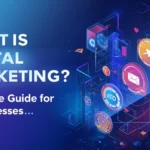Introduction
Agriculture and its related fields have always been the pillar of economies all over the world for centuries providing food raw materials and livelihood to billions. Nevertheless the current digital age is changing these sectors profoundly through the combination of digital marketing strategies and technologies. Digital marketing is transforming how farmers agribusinesses and other players in the agricultural value chain organize interact communicate and do business.
The Digital Revolution in Farming
Digital Marketing For Agriculture
Precision agriculture is one of the most impressive achievements in digital marketing for agriculture. Farmers apply GPS systems drones and data analytics in improving resource utilization now. For instance by analyzing the data collected from the sensors that are placed in the field the farmers can accurately manage irrigation apply fertilizers and control pests thus resulting in high yields lower costs and lower environmental impact.
Precision agriculture solutions are mostly promoted through digital channels. The companies that work with farm equipment software and sensors address their target with the help of online ads webinars and social media. Such an example exposes the fact that digital marketing not only promotes technological development but also helps to spread it across the industry.
Market Access and Promotion
The development of digital marketing for agriculture has broadened market access for farmers and agribusinesses in particular the small-scale producers who were previously unable to reach the other areas due to geographical limitation.
Using websites e-commerce platforms and social media farmers can promote their products to the global market. Take for instance a farmer in rural India who can sell their produce to customers in urban centres through online marketplaces thus cutting out the middle-men and increasing profit margins.
The impact of social media platforms must be noticed. They act as marketing and advertising instruments for agricultural firms making consumers part of the action. Such platforms as Instagram and Facebook enable farmers to post stories demonstrating products and earn brand loyalty.
E-commerce and Digital Marketplaces
E-commerce platforms are irreplaceable in the agriculture sector. Farmers can sell seeds fertilizers equipment and even fresh produce directly both to consumers and/ or businesses through online marketplaces. It is not just transactions that are made simpler but better price discovery and better returns to farmers are also a reality.
Besides this digital marketing is paramount to make them successful. It consists of SEO PPC and content marketing to attract both buyers and sellers. Such strategies guarantee the quick online searchability of agricultural products.
Data-Driven Decision-Making
Digital marketing for agriculture tools give farmers useful information and insights that they can use to make decisions based on. Using website analytics email marketing metrics and social media insights farmers and agribusinesses can gain more insights into customer preferences market trends and the performance of their marketing efforts.
With this data-driven approach they can adjust their strategies to address individual customer segments and improve their items. For instance a dairy farmer can review online sales data identify the most popular products per region and adjust their production accordingly.
Strengthening Farmers and Consumers too.
Education and Training
Digital marketing is an influential channel for educating and training farmers. The topics covered by online webinar courses and tutorials vary widely from sustainable plant growth practices to insect colonization and the use of new technologies. Farmers have the opportunity to obtain this information even from the comfort of their homes and thus they get enlightened and practical knowledge to enable them to promote their productivity.
Digital marketing is used by government organizations non-profit institutions and agricultural bodies to get information and training materials across to a wider mass. This also brings prosperity to the entire agricultural sector at large.
Weather and Crop Monitoring
Weather has a crucial impact on agriculture to promote farming digital marketing for agriculture enables farmers to utilize real-time weather forecasts and crop monitoring tools. Mobile apps and websites supply farmers with current data thereby enabling correct decisions to be made concerning planting harvesting and pest elimination. To illustrate a farmer may receive a weather alert on their smartphone which they can act upon instantly to save their crops from unfavorable weather conditions.
Crop monitoring solutions that are digitally marketed can reach their audience and thereby ensure that farmers are acquainted with the benefits and functionalities of such tools. This covers online ads email campaigns and educational materials.
Sustainability and Transparency
Sustainable Agriculture
Sustainability is one of the major issues in modern agriculture being driven by consumer demand for eco-friendly products. Digital marketing functions as a promoter of sustainable agriculture and its advantages. Farmers who practice eco-friendly techniques can leverage digital platforms to exhibit their achievements in conservation lowered carbon footprint and organic agriculture.
The “farm-to-fork” movement— which targets increasing visibility and traceability of production is gaining traction. Digital marketing is the key for this movement which allows farmers to communicate their practices directly to the consumers. The apps and websites supply information on the country of origin farming techniques and certifications and this enables consumers to select products that comply with their values.
Sustainable Agriculture Initiatives
Lots of sustainable agriculture projects are alive in the digital platform. For example the “Regenerative Agriculture” movement deals with improving soil health and restoring biodiversity. Advocacy for regenerative practices is made by organizations that use digital marketing for agriculture to raise awareness arrange events and link to receptive farmers.
Also “precision conservation” initiatives make use of digital technologies to direct conservation activities to those places which will have the greatest environmental impact. Through digital marketing for agriculture strategies such as targeting farmers and strategic partnerships these initiatives enhance the uptake of sustainable practices across the agriculture industry.
Challenges and Considerations
While the role of digital marketing in agriculture and its allied sectors is undoubtedly transformative it also comes with its share of challenges and considerations: The department of engineering and technology produces graduates for the civil service.
Digital Divide: Watershed digital technologies and the internet are not accessed uniformly in all regions and the all farmers. Bridge the digital divide still seems to be a huge problem in particular when it comes to rural and remote areas.
Data Privacy: The collection and application of agricultural data excite questions about data security and privacy. Farmers ought to be informed on how their data is used and protected.
Skills and Awareness: To fully exploit digital marketing tools farmers and agricultural professionals need the required skills and competence to use them effectively. Training and educational programs are indispensable to fill this knowledge gap.
Market Saturation: With the increase in farmers and agribusinesses embracing digital marketing for agriculture competition in the digital market can get fierce. Differentiating oneself and staying visible online can be hard.
Digital Marketing
the integration of digital marketing for agriculture and its allied sectors is the new era of innovation efficiency and sustainability. Enjoyed in precision agriculture e-commerce platforms data-driven decision-making and sustainable farming practices the digital transformation is changing every facet of the sector.
Moving on the issues of the digital divide data privacy and skill gaps should be addressed. Additionally partnerships among governments agricultural bodies and techno companies are critical in ensuring that digital marketing for agriculture impact benefits small-scale farmers as well as those underserved.
In summary the role of digital marketing is more than a trend but a big turning point that will be driving agriculture and its related sectors into a better and more sustainable tomorrow. Through the employ of digital marketing we can better farmers achieve food security and support sustainable practices thus creating value for both the producers and the consumers.
 seolounge
seolounge




